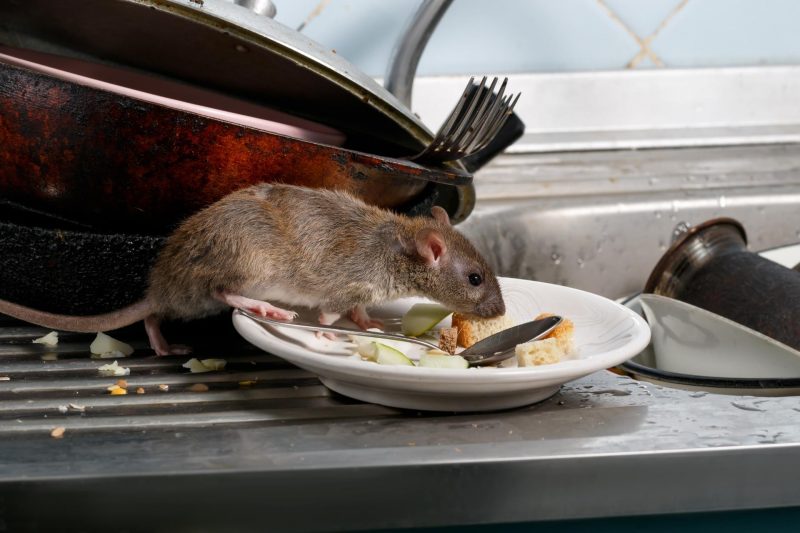One of the worst feelings is opening a drawer or cabinet and discovering poop from a rodent. While many RVers and homeowners often battle mice and other critters getting into their homes, they have to go toe-to-toe with rats in some of the most extreme situations.
If you thought mice were bad, you’re in for a surprise! When you see rat poop, you have a serious problem!
Today, we’ll look at some important things you need to know about rat poop and what you should do if you find rat poop. Put on your rubber gloves and other protection because we’re diving in!
What Does Rat Poop Look Like?
Because rats are much larger than mice, it’s natural for their poop to be much larger. Their droppings are typically half an inch to an inch long and cylindrical.
You’re likely to find them in groups, and the fresher the poop, the darker and shinier it will be. If you discover gray or dusty-looking rat droppings, they’re old and have been sitting for some time.
As gross as it sounds, rat poop often resembles raisins, coffee beans, or large pieces of rice. If you don’t drink coffee, find raisins disgusting, and haven’t eaten large rice grains lately, it’s likely rat poop.
What Attracts Rats to Your House?
Rats, like mice, are typically looking for food or shelter when they enter your home. Rats and other critters will start trying to find their way into your home as the temperatures begin to drop as the seasons change from fall to winter. The cooler the temperatures get, the more determined they will be to find their way into your warm home.
Rats might also get attracted to your house if their old home was destroyed. This could result from nearby construction or the destruction of an abandoned building. They may look large, but they can squeeze into some rather tight spaces.

Is Rat Poop Toxic?
Both rat poop and urine contain diseases and bacteria that can be harmful to humans. We can experience Hantavirus Pulmonary Syndrome (HPS), Leptospirosis, rat-bite fever (RBF), and Salmonellosis.
The severity of these illnesses can vary, but they can be fatal in some instances. If you see evidence of rats in your home, make sure you take the proper precautions to rid your home of them and clean it properly.
Can You Get Sick From Cleaning Up Rat Poop?
One of the biggest mistakes many people make when cleaning up rat poop is not taking the proper precautions. Due to the harmful bacteria found in it, you should always wear gloves and other sources of personal protective equipment (PPE).
Microscopic bacteria can travel through the air. Wearing a mask and eye protection can be extremely helpful to ensure you don’t breathe them in or they don’t come in contact with your eyes. Due to the seriousness of some of the illnesses, you don’t want to take any chances!

Once you finish cleaning up the rat’s mess, make sure you throw away all of the PPE and wash your hands thoroughly. If necessary, take a long hot shower to get off any bacteria that’s found its way onto your skin.
We don’t know about you, but we know we would be taking a shower as soon as possible if we had to clean up rat poop!
What Should I Do If I Find Rat Poop?
If you’re unlucky enough to find rat poop in your home, don’t panic. Yes, it will likely gross you out, and you’ll feel dirty, but panicking will not help. Here are several things you should do after finding rat poop in your home.
Open Windows and Doors
The first thing you want to do is open the windows and doors in your home. You’ll want to vacate the room for at least half an hour while the air helps remove any contaminated particles. Breathing in these particles can be dangerous and cause serious health conditions.
This is a good opportunity to gather your supplies and personal protective equipment. Make sure you have a mask, eye protection, and gloves. These items will help prevent you from breathing in or contracting diseases from contaminated particles.
Clean Up Urine and Droppings
While wearing your PPE, you should thoroughly clean up the urine and rat poop. We recommend placing the droppings and any cleaning wipes into a plastic or disposable sack. Once you clean up the mess, immediately take the wipes and rat poop bag to your outside trash container.
You want to clean up the mess, but you don’t want to stir it up. Avoid using a broom or vacuum. Use a paper towel or napkin to pick up the droppings and place them into a plastic sack.
Don’t let the droppings sit in the bottom of the trash can in your kitchen. If so, you risk spreading the bacteria into the air every time you throw something away or take the trash out later. Get everything out of your house as soon as possible!
Disinfect the Whole Area
Use an antibacterial cleaning spray to wipe down all the contaminated surfaces. If you want to create your own cleaning solution, a 1:10 ratio of bleach and water is a great option. Let it sit for five minutes to kill any bacteria before wiping the surfaces clean.
Immediately throw any cleaning rags, clothing, or other items that came in contact with the rat waste. If you have to wash anything, you’ll want to use plenty of soap and the hottest water possible. This helps ensure your clothing and other items get as clean as possible.

Dispose of Contaminated Materials
Make sure you dispose of anything contaminated or messed with by the rats. Rats can carry bacteria on their feet when walking or getting into containers. Throw away any food or items that the rats may have contaminated.
You don’t want to take any chances of trying to save food or other items that could be contaminated. Harness the frustration from the wasted food and other items to win the battle against the rats.
Seal Gaps
You’re wasting your time cleaning up after the rats if you don’t seal up the gaps where they’re getting into your home. Look for any obvious holes or spaces in your home where they or other critters could be getting in.
Completely seal around plumbing and other crevices where mice can easily squeeze through. Using steel wool and gap sealant are very effective ways of sealing off large spaces.
Create a Plan
You need to create a plan for dealing with rats and other critters. Are you planning to use traps? Electric deterrents? Get a cat? All of these can be great options, but that depends on how aggressive you want to be in your effort to get rid of the rats.
Make sure everyone in your home is aware of the plan and the importance of sticking to it. Everyone needs a reminder to clean up food as soon as possible and not leave anything out that could attract rats.
HOT TIP
Make sealing any gaps or holes in your home part of your RV maintenance checklist.
Call a Professional When Needed
If you don’t seem to be making any progress in winning the war against the rats in your home, you may need to call in a professional. They’ll be able to provide some serious help with getting your home rat-free as quickly as possible. They are typically trained and have experience with these types of situations.
While these can be expensive options, they can be worth every penny if it means ridding your home of rats. You can’t continue living in a home or place with a rat infestation. If you aren’t making any progress within a couple of weeks, call a professional.
Avoid a Serious Problem and Take Action
Discovering rat poop is a very serious problem. You should immediately take action to rid your home of these disease-carrying rodents. The longer you put off taking action, the larger the problem can become. You don’t want these rodents living rent-free in your home! Take action and call in the professionals if necessary!
Have you ever had rat problems? What was the solution?
If You Want the Latest Travel News, Join Our Mailing List
Don’t rely on biased RV industry news sources to keep you informed. Stick with Nomadic News. We publish articles and breaking stories that matter to you every weekday.










